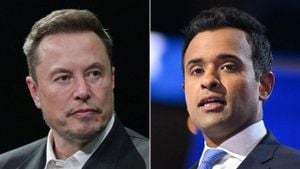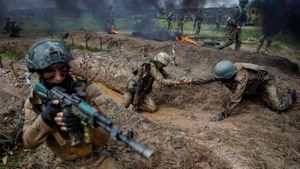BAKU, Azerbaijan—With just days remaining until the conclusion of the annual COP29 climate talks, negotiators are working against the clock to address the pressing issue of climate finance, amid growing tension and concerns over commitments from developed nations. The central question looming over this year’s summit is how to mobilize the hundreds of billions—if not trillions—needed to help developing countries combat the impacts of climate change and transition to more sustainable energy sources.
Despite being labeled the "COP"—an acronym for Conference of the Parties—the atmosphere feels less like collaborative negotiations and more like a treadmill of stalled progress. After eight days of discussions, representatives from vulnerable nations have expressed their discontent, finding themselves at the mercy of the larger economies’ reluctance to commit substantive funding. Currently, only about $120 billion per year is allocated for climate funding, which is alarmingly short of the $1.3 trillion target proposed by developing nations by 2030.
Developing countries argue it is their future at stake, with many urging rich nations, who've caused the majority of climate emissions, to step up their financial support. Michai Robertson, representing the Alliance of Small Island States, expressed frustration at the tactics employed by wealthier countries, stating they often resort to accounting tricks instead of making the real financial commitments needed to address this crisis. "It’s kind of depressing, in reality," he said, criticizing the lack of transparency around proposed financing structures.
The negotiations are now contending with three principal areas of contention: the size of the financial commitment, the balance between loans and grants, and which countries should be considered eligible for assistance. Emerging economies have reverberated their concerns about the proposed informal numbers creeping around—figures such as the $200 billion floating around the negotiating table, which they swiftly deride as largely inadequate.
For many, this figure is hardly the “headline” number sufficient to address the climate debt owed to them. "Is it a joke?" pronounced Diego Pacheco, the Bolivian negotiator, as he articulated the frustrations of the Like-Minded Developing Countries group, which includes major economies like India and China. These nations are adamant any financing solution must be equitable and not place undue burden on developing countries, especially those already grappling with the repercussions of climate disasters.
The politics of these talks are complicated. While many outside observers call for immediate action to address climate change through increased financing and support, the internal dynamics within the negotiations are creating gridlock. "Without trust, there can be no constructive negotiations," emphasized Jennifer Morgan, Germany’s special climate envoy, highlighting the significant role the presidency holds during these talks as the negotiators await the draft proposals expected to emerge from the host nation.
The outcome of COP29 will not only serve as the cornerstone for future climate actions but also illuminate the depth of commitment from the global north to support their southern counterparts as climatic realities become harsher. Current discourses lean heavily on the urgency of addressing urbanization challenges as climate impacts increasingly threaten the livability of cities, which contribute significantly to global emissions.
Experts warn the world faces another dire consequence if climate financing fails. The latest report from the UN Environment Programme reveals emissions have risen by 1.3 percent this year, contrary to the urgent need for reductions to keep global warming below the 1.5-degree Celsius threshold. It’s clear all eyes are on the major players—nations like the U.S. and members of the European Union—to not only rethink their funding strategies but also their roles as climate leaders.
Within discussions at COP29, calls have also been made for reform around how climate finance is structured, with voices from developing nations demanding the flow of funds transition from loans—which carry strict repayment conditions—to grants to effectively address climate adaptation needs. "We need to shift from loans to grants for adaptation, ideally triple—don’t double—adaptation funding by 2025," Ali Mohamed, chair of the African Group, insisted.
The historical pattern of COP meetings reveals significant weariness among delegates; both previous conferences ran over schedule, hinting at the systemic challenge of reaching consensus. Even now, the situation at COP29 showcases tensions around fossil fuel dependency, particularly among oil-producing nations. Saudi Arabia, for example, has previously stalled discussions aimed at phasing out fossil fuels, but calls for action have only intensified as climate catastrophes grow more evident.
Back at home, climate activists are expressing their frustrations toward negotiators, fearing the talks may break under unmet commitments, especially as they contend with the concept of "climate fatigue", where the enormous structure and expectations of COP meetings start to hinder genuine progress.
Yet disappointment is palpable; with many developing nations arguing their voices and needs of the most vulnerable populations seem overlooked or treated as secondary. The stakes are characterized as more than just financial—they represent lives, livelihoods, and futures. “These negotiations need to represent justice,” insisted one climate advocate, signifying the deep-rooted need for equity within any climate financing framework.
Experts at the summit continue to stress the urgency of turning rhetoric from each participating nation, especially those with obligations to aid climate-vulnerable countries, to actionable commitments. The upcoming days at COP29 promise to be defining moments, as negotiators push for pivotal breakthroughs over the climate finance stalemate. "We need clarity, we need urgency," urged those observing closely, knowing full well the consequences rest not just on these talks, but on the world itself.



